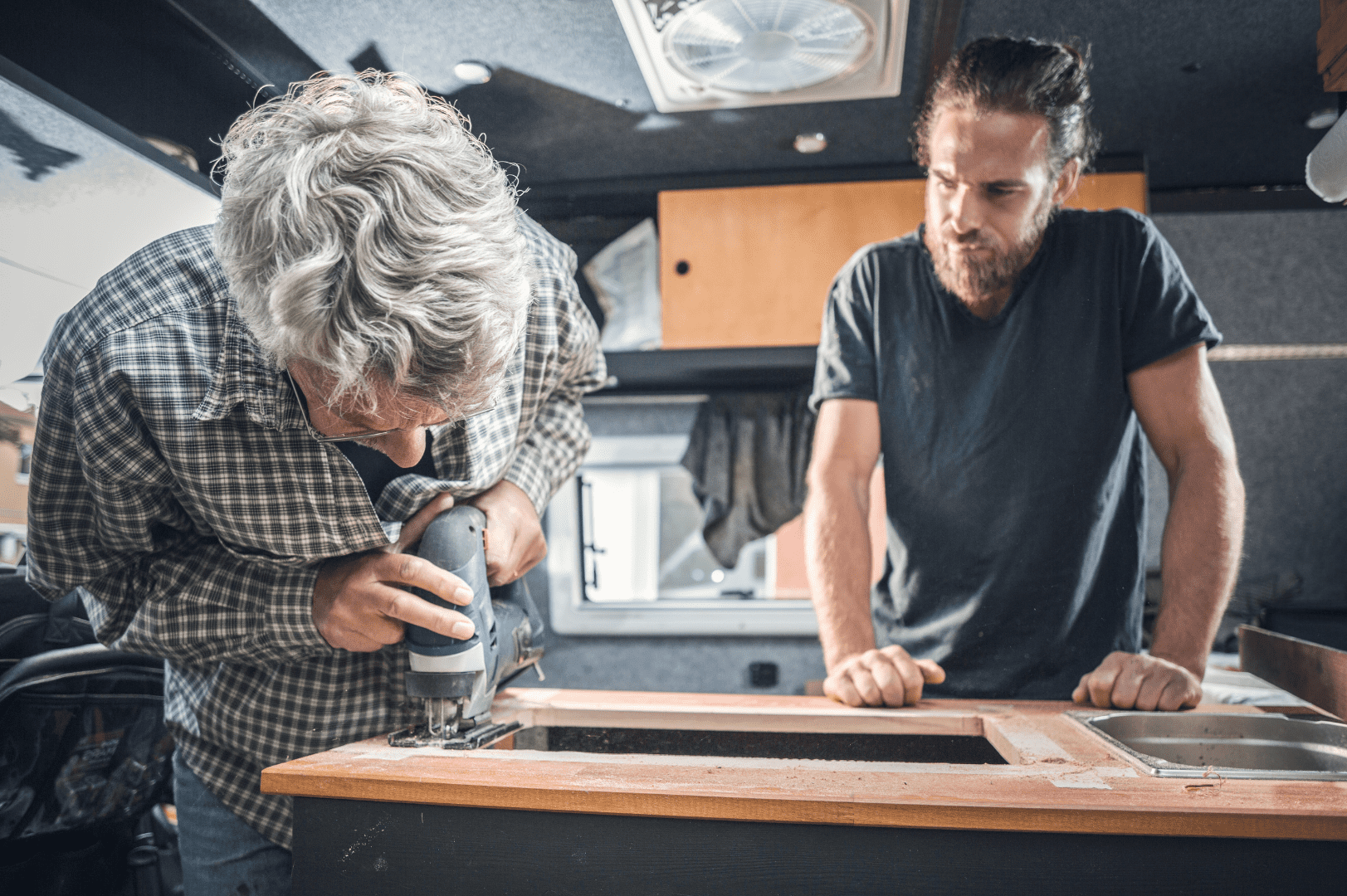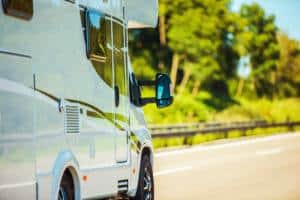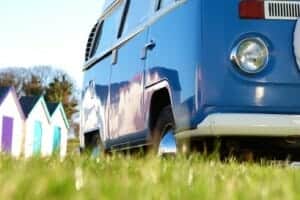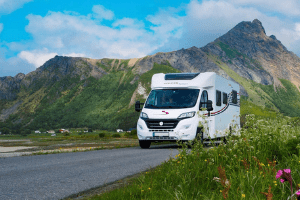The time has finally come, your going to convert your van into a campervan, you have searched on the DVLA website, you want to make sure that the conversion follows all the guidelines that are set out on the website.
The good news is that if you can re- register the vehicle as a “Motorcaravan” you will be able to get a better rate of insurance compared to normal van insurance.
Here is where the issues may start to get a little more complicated.
In October 2019 the DVLA changed how they reclassify converted panel vans. You may encounter a problem when you try to re-register your van as a ‘motor caravan.’ The criteria is all set out on the DVLA website, your vehicle may comply with what’s listed, but the DVLA may still not reclassifying it as a ‘motor caravan,’ this could be due to the outside still looking like a panel van, they may just reclassify it as a ‘van with side windows.’
Between 2019 and 2020 there were 14,942 applications to the DVLA to reclassify a converted panel van as a motor caravan, but only 806 of those applications were successful, meaning as little as a 5% of the vehicles met their exacting criteria.
As Private Pike would say “DON’T PANIC”
No need to worry!!! as soon as we heard of these issues that some of our customers faced, we worked alongside our underwriters Aviva to make sure that we would still insure these vehicles, treating them in the same way as reclassified converted panel vans. So regardless of the outcome, whether you’re set for your first trip in your motor caravan or a van with side windows we have you covered.
How to convert a van into a campervan
As mentioned above to be officially classed as a campervan, it will need to meet certain specifications. In reality, a lot of the features needed are ones that you’ll want to install anyway – such as extra windows, beds, table and seats and cooking facilities. You can find details at GOV.UK, but as a guide, here’s what you’ll need to think about:
Van body type
The DVLA (Driver and Vehicle Licensing Agency) will only consider recognising your conversion if the original body type falls into one of 14 groups – this includes all sorts of vans so don’t be put off, you can find a full list at GOV.UK. but we have listed for you here.
The body types the DVLA will consider reclassifying to a ‘motor caravan’ as per their website in August 2020 are:
- Ambulance
- Box van
- Goods
- Insulated van
- Light goods
- Light van
- Livestock carrier
- Luton van
- Minibus
- MPV (multi-purpose vehicle)
- Panel van
- Specially fitted van
- Special mobile unit
- Van with side windows
DVLA motorhome conversion requirements
The DVLA require that your campervan:
- Has a certain body type
- Meets the internal features required
- Meets the external features required
External Specifications:
As per the DVLA website in August 2020, this list describes the external features which are commonly seen in motor caravans, and it is intended to provide guidance on what DVLA expects to see when considering your application:
- 2 or more windows on at least one side of the main body (this does not include windows on the driver or passenger doors) to provide a reasonable amount of daylight into the living accommodation
- A separate door which provides access to the living accommodation of the vehicle (this excludes the driver and passenger doors); a window on this door counts as a separate window on the main body
- Motor caravan-style graphics on both sides of the vehicle
- An awning bar
- A high-top roof (this does not include a pop-top elevating roof)
The above could be mis read and some clients do just 1 or 2 items from the list above
Although the above is exact wording from the website, in our experience we have had customers who have ticked all the above and they still have not reclassified the vehicle as “MOTORCARAVAN” on the V5C.
Internal Specifications:
Since August 2020 the DVLA would expect the internal features to be fixed, below are the main specifications required.
Seats and a table
- They shall be an integral part of the vehicle living accommodation area, mounted independently of other items
- A table mounting arrangement shall be secured as a permanent feature, although the table top may be detachable
- Permanently secured seating must be fixed to the floor or sidewall and available for use at the table
Sleeping accommodation
- Shall be an integral part of the vehicle living accommodation area
- Can be either beds, or beds converted from seats
- Must be secured as a permanent feature, either with the base structure of the vehicle floor or to the side wall, unless the sleeping accommodation is provided over the driver’s cab compartment
Cooking facilities
- Your conversion must have a minimum of a single ring cooking facility or microwave, which shall be secured directly to the vehicle floor or side wall as a permanent feature.
- If the cooking facility is fuelled by an on-board gas supply, the fuel reservoir must be secured in a storage cupboard or the reservoir secured to the vehicle structure
- If the cooking facility is fuelled by gas having a remote fuel supply, the fuel supply pipe must be permanently secured to the vehicle structure
Storage facilities
- Can be a cupboard or locker
- Form an integral part of the vehicle living accommodation, mounted independently of other items, unless incorporated below the seat, sleeping accommodation or cooker
- Must be secured permanently to the vehicle floor or side wall except when the storage facility is over the driver’s cab compartment
What’s the best van for a conversion?
Classic campers are all well and good but very little can beat the sense of achievement you’ll get from converting your own, but what to choose?
Well, the best van to convert will be one that suits you and is large enough to cater for your needs, consider:
- The length of time you’ll be in your campervan – will it be used for short breaks or are you planning on taking it abroad for lengthy excursions? The more time you spend in it, the more comfortable you’ll need it to be.
- How many people it needs to sleep – especially if you’re a family and plan on using it for years to come.
- Storage space – space is always going to be at a premium in a campervan but if you’re travelling all year round and venturing off the beaten track, consider any equipment you’ll need to carry – for instance, snow chains, a generator or camping gear.
- Licence limits – the type of vehicle you get may also depend on your driver’s licence. If you passed your test before 1 January 1997, you can drive a vehicle up to 8,250 kg (8.25 tonnes), this is the maximum authorised mass or MAM which includes the load. MAM is also known as the gross vehicle weight (GVW). In other words, the van you convert, including what you carry in it can be no more than the MAM or GVW. If you passed on or after 1 January 1997, you can drive vehicles up to 3,500kg (3.5 tonnes) MAM. If you want to drive something heavier, you’ll need to take a test.
Some of the most popular vans for conversion include the Mercedes Sprinter and the VW Transporter, both have models that vary in GVW from 3 tonnes to 5 tonnes.
If you’re looking for something a little smaller, consider the Peugeot Boxer or Renault Master, it comes in various lengths and ranges from 2.8 tonnes to 3.5 tonnes GVW but bear in mind it only comes in one height so less versatile in terms of space.
A good all-rounder is the Ford Transit, the Custom model comes in a wide range of sizes with GVW from 2.5 tonnes to 3.4 tonnes.
What items will I need to carry out a DIY camper conversion?
What you’ll need will depend on how hands-on you intend to be. If you’re carrying out the conversion yourself, then you’ll need all the right tools and equipment including things like insulation, cladding, a jigsaw and drill. There are numerous, technical step by step camper van conversion guides online that you can follow depending on your level of DIY skill.
If you’re looking for layout ideas, you can find several online for inspiration. These are a great starting point and will help you visualise where to position cooking, sleeping, living, and toilet facilities. Also, think carefully about the electrics and any back-up energy sources you might need (such as solar panels, an inverter or generator). Below is a link to a couple who converted there Van, this is just a view of what can be done but there are many more links online to view to get an idea of what processes are involved.
https://www.youtube.com/watch?v=JpZNuLUhkA4
Unless you’re qualified, it’s a good idea to have the electrics, plumbing and gas fixtures fitted by a professional – especially as you may need a gas safety certificate to ensure your campervan insurance is valid.
If you don’t fancy doing it all yourself, think about buying a camper conversion kit. There are several firms that advertise online who will supply the fixtures based on your van and the layout you want. These will be supplied either as a flat pack for you to install yourself, or it can be fitted for you for an additional charge.
Do I need to tax my van while it’s being converted?
If you don’t plan on using your van at all during the conversion then you can register for a statutory off road notification or SORN. But remember, if you have a SORN, you won’t be able to drive your vehicle at all (unless it’s to a pre-booked MOT).
How long does it take to carry out a campervan conversion?
Ultimately, this will depend on how much time you devote to your DIY camper conversion project so there’s no average time frame. A lot will also come down to whether you choose to convert your van by yourself or whether you decide to buy a camper conversion kit.
Plus, don’t forget, you’ll also need to spend time researching and planning your conversion – rushing into it could result in costly mistakes that are difficult to undo.
How do I register my camper van conversion?
When you’ve completed your DIY camper conversion, you’ll need to apply to the DVLA to change its category from ‘van’ to ‘motor caravan’ or ‘van with side windows.’ You’ll need to include evidence of the conversion including detailed photos – you can find more advice and the address to send your application at GOV.UK, converting a vehicle into a motor caravan
Plan your kit and your adventures
Once the hard work’s done, it’s time to plan the holiday kit you need and for the fun to start. To make sure you don’t forget anything, think carefully about where you’re going, how long for as well as the activities you’ll be doing. For inspiration take a look at our top 20 best campervan gadgets for some ideas to help out with life on the road.
Stay protected with the right campervan cover
The insurance industry will treat the classification differently depending on who your source your insurance from, you will hit different rating criteria from company to company. Here at Comfort insurance, we will make sure that the right cover, at the right price will be offered. Why not try us out and see how our campervan insurance quote compares? Give us a call on 0208 984 0666 to speak to our friendly team today.













